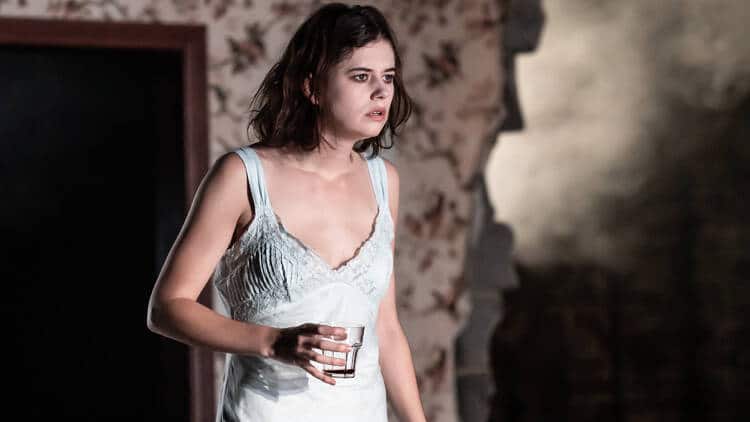Almeida Theatre, ‘Impressive depiction of crumbling mental health’
Your enjoyment of a show can be as fickle as a spring breeze. Sometimes the stars don’t align, and a serene work might fall on deaf ears or a closed heart. The day you have led leading up to the anticipated evening obscures the trip itself.
This is the conundrum I find myself in with the Almeida’s recent revival of Marina Carr’s 1996 grief-stricken drama, Portia Coughlan.
Was I ready for almost two and a half hours of drink, misery, suicide, betrayal, bickering, more drinking, and the bleak landlocked Irish countryside? No, no I was not.
But Carr’s work forces you to persevere through the oppressive clouds, burrowing its way into your soul and sinking in its sharp little teeth.
Meet Portia, 30, a woman infinitely complex, the belle of a small town. She has everything on paper: a rich husband, a large family support network, two children, but as so often with life, it’s not enough.
Hounded by the ghost of her twin who disappeared into the Belmont River behind her house, she thrashes about maiming all and sundry.
Alison Oliver returns from her success in February’s Women, Beware of the Devil to provide another jaw-dropping performance.
Diminutive, in a scraggy t-shirt, short shorts, and wellies for most of the play, she carves a path of devastation, bloody and brutally managed.
Carr’s reimagining of modern Irish women, free from the male gaze, is stark under the microscope.
Portia is a reluctant mother, a woman half in this world and half out, constantly begging to be “left alone”. Do we pity her? Do we hate her? It’s rather hard to tell. She can be venomous, utterly venomous, yet somehow cursed and inculpable.
Oliver is at her best when throwing barbs across the stage at various family members or her husband, or breaking into the flowing prose that at points threatens to drown the play.
Alex Eales’s set is literally nature collapsing into Portia’s home, with the bank of the ever-present river tumbling down through a roughly ripped hole in the domestic setting.
Outside and inside blur perfectly, making the following tale feel as set as the course of the waterway.
This allows Archee Aitch Wylie’s plaintive voice, singing Maimuna Memon’s baroscopic score, to puncture the more naturalistic scenes.
Wylie on the riverbank, crying out to Portia, as Gabriel, her lost twin, keeps us teetering on the edge of the supernatural. Are we inside Portia’s mind? Or simply trapped in her living room? Is the pull of death as inevitable as she seems to think it is?
Aside from Carr’s impressive depiction of crumbling mental health, and the plight of a woman trapped in life, there is a sense at points of oversaturation.
As Portia’s mental state is more and more unstable it brings out the age-old grievances that small communities can harbour.
At a funeral, these are brought to a boil, blanched in whisky, and despite the seriousness of all involved, the effect is somewhat ludicrously layered on with a trowel.
Incest, disappointment, domestic violence, sex work, and shame, shame, shame.
“It’s in your blood,” is spat out by Sorcha Cusack, the gruesome and viscous Blaize Scully (Portia’s grandmother), only to be bested by another explosion of home truths from (Derry Girls) Kathy Kiera Clarke as the free-speaking aunt Maggie May.
Mairead McKinley as Portia’s mother and Mark O’Halloran as her father have a swing at the who-can-hurt-whose-feelings-the-most game, before everyone is turfed out into the (presumably) drizzling rain.
Is this Carrie Cracknell’s otherwise dextrous direction straining at a difficult scene, or is Carr’s writing trying too hard to jam in enough meaty dialogue?
The secrets that strangle the Scullys and Coughlans lose their edge with the sheer volume and one-upmanship of each unveiling.
The lack of much comic relief is a factor in the unrelentingly pounding nature of the show.
Fergal McElherron as Maggie May’s lovable “eejit” husband, Senchil, valiantly tries his best with bumbling sweetness. Yet this proves ineffective in the downpour of emotional acid rain.
Reviewers are meant to stand as ivory statues of theatrical objectiveness and that just isn’t true.
Perhaps it’s the fact that the spectral twin and I share the same name, or that me and Portia are the same age, but the grinding, snapping, and sniping of the characters got to me.
Perhaps this is a testament to Carr, Cracknell, and Oliver’s undoubtable determination.
Feeling the cold lapping of the Belmont River, as if I were trapped on its bank, gazing into its dark waters.
Grand theatre indeed, although unsettling would be putting it mildly, and viewer discretion is most certainly advised.
This has now finished, but click here and see what else wonderful shows are on at the Almeida!



